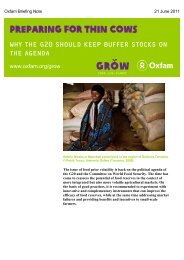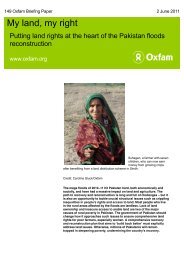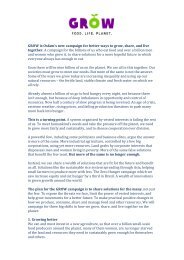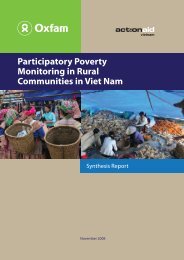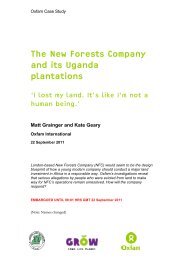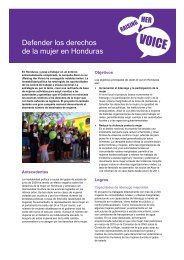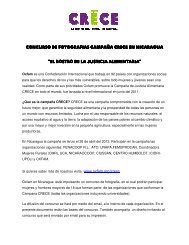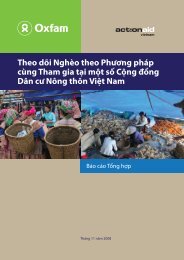Untitled - Oxfam Blogs
Untitled - Oxfam Blogs
Untitled - Oxfam Blogs
You also want an ePaper? Increase the reach of your titles
YUMPU automatically turns print PDFs into web optimized ePapers that Google loves.
Impacts of Price Hikes<br />
on the Life and Livelihoods<br />
of the Urban Poor<br />
Migrants doing informal jobs accept harsh working conditions in jobs such as motorcycle taxi/cyclo driver,<br />
waste collector, assistant construction worker and street vendor in order to earn extra income to send home<br />
to support their families and pay for their children’s education. The main risk faced by this group is income<br />
instability. As prices increase they can lose clients. For example, since the hike in petrol prices at the end of<br />
July 2008, the number of motorcycle taxi passengers has fallen. Similarly street vendors are worse off as<br />
they have to buy and sell goods at higher prices. An exception is those who sell essential daily items and<br />
cheap breakfast snacks. They manage to keep the same number of clients as “people still have to buy these<br />
essential things no matter how much the prices go up”.<br />
“I am a xe om [motorbike taxi] driver. So I move around. I either eat at home or outside<br />
depending on where I am. As petrol becomes more expensive everything else is affected.<br />
Before Tet, I paid only 8,000 VND for a meal. After Tet it was 10,000 VND. Since yesterday<br />
when the price of petrol went up again the same meal (actually a smaller portion now) cost<br />
12,000 VND”.<br />
(Discussion with xe om drivers group in ward 17, Go Vap district, HCMC, July 2008)<br />
“Before I would buy as much as 35 kg of fruits to sell in the street. Now I only dare buy 12<br />
kg only as the sales are very slow. Everything is so expensive now so people care more about<br />
essential things such as rice and vegetables. Less essential things like fruits are often cut. We<br />
can sell more on the 1st and 15th days of each lunar month, on weekends or national<br />
holidays. On a regular day, we cannot sell much, sometimes only 10-20, 000 VND worth of<br />
fruits, which is not enough to cover our expenses”.<br />
(Discussion with street vendors group in Niem Nghia ward, Le Chan, Hai Phong, June/2008)<br />
Mrs. N. T. L., 43, of Vnh Phúc province, is renting lodging in Unit 4, ward 6, Go Vap district<br />
and selling children’s toys in the street. Her husband is also with her. He is a street massage<br />
worker. They left their two children (a girl in grade 7 and a boy in grade 9) with their parents.<br />
Each month they send home 1 million VND. However since the beginning of this year they<br />
have been trying to send 1.5 million VND as “everything back home has become more<br />
expensive now”.<br />
Life is more difficult this year as prices have increased while sales have stayed the same. They<br />
have to limit their total daily expenditure to 30,000 VND (compared to 20,000 VND in 2007).<br />
The price of food increased the most rapidly. They now only buy the cheapest rice possible<br />
and never eat out. Their lodging rent has increased from 500,000 in 2005 when they first<br />
arrived to 650,000 VND (a small 4mx4m room they share with a brother). Normally Mrs. L.<br />
can make 40,000 VND a day from selling toys. This year toys are more expensive and she<br />
cannot sell as much. For example, a plastic ball cost 6,000 VND in 2007 and she was able to<br />
sell it at 9,000 VND. This year she has to buy it for 7,000 VND and sell at only 9,500 VND.<br />
Mrs. L. and her husband moved to the city in 1999. When asked why she had travelled so<br />
far from home she replied: “We can make more money here. If we went to Hanoi which is<br />
very close to home we would have had to go back every month. Then we would not have<br />
been able to save any money. As we are here, each year we only go back at Tet holiday.”<br />
Also, in Hanoi, the ban on street vendors is more strictly enforced. One year she went back<br />
to the north for Tet and tried to sell toys in Hanoi. However she could not do much as she<br />
was “scared away”. “Over here, it is a suburban area so it’s easier to move around. District<br />
1 also has banned street vendors. However, It is still ok in Go Vap district. Maybe in a few<br />
years I will have to find a new job, such as collecting waste or selling sticky rice cakes.”<br />
Mrs. L. and her husband have some land to lease in their home village. They also built a four<br />
room house with tiled roof in 2001. Their plan is to "continue to work here. The longer the<br />
better. Only when our parents fall sick will we have to go back to look after them”.<br />
(Interview with Mrs. N.T. L., migrant street vendor in Unit 4, ward 6, Go Vap district, July 2008)<br />
Their food patterns have also changed. They eat cheaper items and less meat. However the situation is still<br />
very difficult to manage. Their savings have reduced significantly. Most migrants doing informal jobs have<br />
63



